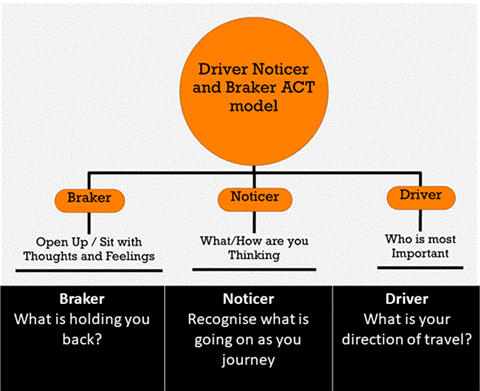
.The Driver, Observer, and Brake Model in the Structure of Acceptance and Commitment Therapy
11 months ago
بقلم : Daniel Farmer Translation and Editing: Managing Editor, Professor Mohammed Al-Saeed Abu Halawa
ACT (Acceptance Commitment Training/Therapy) as an Established Idiomatic Expression
ACT, or Acceptance and Commitment Training/Therapy, is one of the most significant mindfulness-based behavioral therapies. Proponents of ACT do not seek to eliminate pain because, whether we like it or not, "pain" and "suffering" are integral parts of human existence.
The core and central concept of ACT is psychological flexibility. The ultimate goal of ACT, in its final analysis, is to enhance psychological flexibility in individuals. But what does that mean?
Psychological flexibility refers to a person’s ability to acknowledge and accept the presence of difficult and unwanted thoughts and emotions while continuing to engage with life, welcoming it, and performing meaningful and purposeful tasks.
In this sense, psychological flexibility is the opposite of psychological rigidity or inflexibility, which involves handling life's hardships and challenges in unhelpful ways—primarily by avoiding these difficulties or even ignoring and denying them as if they do not exist. It is well known that turning our backs on real-life suffering and struggles does not eliminate them; instead, it entrenches negative emotions and deepens suffering.
Navigating life with an avoidance mindset as a simple solution overlooks the reality that life is complex and filled with countless sources of pain and suffering. If our main goal in life is to avoid pain, we will not be able to learn new ways to cope with life, nor will we achieve any form of personal growth or flourishing.
Additionally, if we ignore the reality that mistakes are part of learning and that failure often accompanies the journey toward success, we forget the heavy price we may pay for such neglect. Simply put, trying to avoid pain results in more pain, more suffering, and more hardship.
While acknowledging that pain and suffering are natural parts of life, ACT proponents aim to enhance psychological flexibility through evidence-based educational techniques and intervention strategies, which significantly reduce emotional distress.
This is because ACT directly teaches us that "the goal of life is to live a full, meaningful, and purposeful life" rather than simply avoiding pain. Life should be engaged with, and its full range of experiences—both positive and negative—should be embraced.
Key Features of ACT Compared to Other Psychological Therapies:
Building Psychological Flexibility
-
- ACT aims to enhance psychological flexibility by teaching new skills that help us navigate life in innovative ways. These skills are backed by clear, practical applications and exercises that are easy to use.
Teaching Psychological Resilience
- Resilience in ACT is not just about endurance or recovery but about thriving despite adversity.
- ACT helps us stop fighting our thoughts and emotions. Instead of struggling against them, ACT encourages viewing thoughts and emotions as temporary experiences that come and go rather than absolute truths or definitions of who we are.
Guiding Individuals Toward Value-Driven Action
- ACT helps people identify what truly matters in their lives—values, meaningful goals, and priorities—then guides them toward committed action aligned with these values.
A Transdiagnostic and Contextual Approach
- ACT does not focus on diagnostic labels or categorizing disorders according to clinical manuals. Instead, it adopts a contextual approach that emphasizes positive social behavior.
- This makes ACT highly adaptable and applicable across various settings, including individual counseling, mental health interventions, organizational training, team building, decision-making, and coaching.
- ACT helps people identify what truly matters in their lives—values, meaningful goals, and priorities—then guides them toward committed action aligned with these values.
- ACT aims to enhance psychological flexibility by teaching new skills that help us navigate life in innovative ways. These skills are backed by clear, practical applications and exercises that are easy to use.
ACT as a Training-Based Approach
Daniel Farmer, in his specialized training programs, describes ACT as a process aimed at developing psychological flexibility in individuals and groups. Psychological flexibility, according to Farmer, frees a person’s thinking and behavior from psychological rigidity, which is characterized by rigid, maladaptive thought patterns and behaviors that hinder effective functioning in life.
Psychological rigidity often leads people to deal with challenges in counterproductive ways—typically through avoidance or denial. In contrast, ACT encourages value-driven living, where people act in alignment with their personal values and life goals while acknowledging and accepting the obstacles—both mental and behavioral—that may arise.
Psychological rigidity is often the main factor hindering progress in life and clouding one's judgment about what is beneficial and meaningful. It leads to poor decision-making and a higher likelihood of getting stuck in negative cycles.
While ACT is classified as a "therapy," its approach is fundamentally educational and training-based rather than purely clinical. It teaches practical life skills that help individuals strike a balance between acceptance and committed action based on their values.
Mindfulness with Purpose: The ACT Formula
ACT can be thought of as a fusion of mindfulness and goal-directed behavior rooted in personal values. This approach enables individuals to:
- Recognize and observe their thoughts, emotions, and behavioral patterns.
- Engage with these experiences in a psychologically flexible way.
- Use a structured framework for navigating life's challenges through what is known as the Hexaflex Psychological Flexibility Matrix.
Key Takeaways from ACT:
Developing Psychological Flexibility
-
- ACT teaches new skills that help individuals approach all aspects of life with greater adaptability.
Resilience Without Struggle
- ACT fosters emotional endurance by encouraging people to let go of internal battles with their thoughts and emotions. Instead of fighting them, they learn to observe, accept, and detach from them without letting them define their identity.
Value-Based Living
- ACT helps individuals identify their core values and take committed action toward them.
Beyond Clinical Diagnosis
- ACT does not focus on clinical labels but rather on promoting positive social behaviors and enhancing well-being across various settings, such as therapy, coaching, and corporate training.
- ACT helps individuals identify their core values and take committed action toward them.
- ACT fosters emotional endurance by encouraging people to let go of internal battles with their thoughts and emotions. Instead of fighting them, they learn to observe, accept, and detach from them without letting them define their identity.
- ACT teaches new skills that help individuals approach all aspects of life with greater adaptability.
The Driver, Noticer, and Braker Model
Daniel Farmer developed the "Driver, Noticer, and Braker" model, which adapts elements from Russ Harris’s ACT Tri-Flex Model and Kevin Polk’s ACT Matrix.

This model is a metaphorical framework that represents how individuals navigate life:
The Driver (Direction and Purpose)
-
- Represents the person’s ability to take control of their life’s direction, guided by values and meaningful goals.
The Noticer (Awareness and Observation)
Represents the ability to observe and remain aware of one's journey, both internally (thoughts, emotions) and externally (life circumstances).
The Braker (Self-Regulation and Pause) - Represents the person’s ability to slow down, reassess, and take corrective action when needed—especially in the face of fear, anxiety, or uncertainty.
- Represents the person’s ability to take control of their life’s direction, guided by values and meaningful goals.
Final Thoughts: ACT as a Path to Psychological Flexibility
The ultimate goal of ACT is to enhance psychological flexibility and empower individuals to break free from psychological rigidity—which manifests as:
- Dwelling on the past with regret and sorrow.
- Getting lost in the future with unrealistic expectations and wishes.
- Neglecting the present moment, leading to a lack of engagement with life.
Psychological flexibility is built on three fundamental dimensions:
Flexible Thinking – Developing openness and adaptability in dealing with challenges
Behavioral Freedom – Acting according to values, even when the mind resists change
Purpose-Driven Action – Making choices aligned with what truly matters in life
ACT encapsulates these principles in the ACT acronym itself:
Accept your experiences → Choose your values → Take committed action.
By embracing this approach, individuals shift their focus from struggling against suffering to actively building a meaningful life—one guided by acceptance, values, and committed action.


